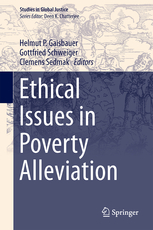 It will take some time until this volume will be published, maybe around the end of the year or the beginning of 2017. Anyway, it is already advertised on the homepage of Springer. This volume, which I co-edited together with my dear colleguaes from Salzburg, Helmut P. Gaisbauer and Clemens Sedmak, explores the philosophical, and in particular ethical, issues concerning the conceptualization, design and implementation of poverty alleviation measures from the local to the global level. It is published within the Springer book series "Studies in Global Justice", which I like a lot and is edited by Deen K. Chatterjee, who supported us from the beginning. Below you find the table of contents, so that you can start thinking about reading it, if you like what you see. In particular I am happy about the very nice endorsements that we got for this volume, one by Judith Lichtenberg and one by David Crocker. I think both are fabulous philosophers, so if they like it, it might actually be a good book. I copy both of them here because they are so nice: "An impressive collection of essays by an international group of scholars on one of the most fundamental issues of our age. The authors consider crucial aspects of poverty alleviation: the role of human rights; the connection between development aid and the alleviation of poverty; how to think about poverty within affluent countries (particularly in Europe); and individual versus collective obligations to act to reduce poverty." Judith Lichtenberg Department of Philosophy Georgetown University "This collection of essays is most welcome addition to the burgeoning treatments of poverty and inequality. What is most novel about this volume is its sustained and informed attention to the explicitly ethical aspects of poverty and poverty alleviation. What are the ethical merits and demerits of income poverty, multidimensional-capability poverty, and poverty as nonrecognition? How important is poverty alleviation in comparison to environmental protection and cultural preservation? Who or what should be agents responsible for reducing poverty? The editors concede that their volume is not the last word on these matters. But, these essays, eschewing value neutrality and a retreat into technical mastery, challenge us to find fresh and reasonable answers to these urgent questions." David A. Crocker School of Public Policy University of Maryland The next forum section of the Zeitschrift für Praktische Philosophie (ZfPP) will be dedictated to questions relating to doing philosophy as a job and within the institutional setting of a university. The subtitle suggests the topics potential papers can examine: precarisation, publish or perish, dream job? Given the situation at many universities and the bleak prospects for most younger and many not so young colleagues discussions need to start now. The ZfPP is a fully open access journal and publishes papers in German only. Hence the call for papers is also in German:
Philosophie an der Universität: Prekarisierung, Publish or Perish, Traumjob? Aufruf zur Einsendung von Beiträgen für ein Forum in der Zeitschrift für Praktische Philosophie Schon seit längerer Zeit ist der Zustand der Philosophie als Wissenschaft und Teil der Universität und die Bedingungen, unter denen PhilosophInnen arbeiten und Philosophie professionell betreiben, ein Thema. Insbesondere die Situation des Mittelbaus muss großteils als prekär und unsicher bezeichnet werden, was nicht ohne Auswirkungen auf die Lebensqualität der betroffenen KollegInnen bleibt. Das ist sicherlich nicht eine für die Philosophie spezifische Situation, sondern Veränderungen auf Ebene der Universitäts- und Wissenschaftspolitik im Allgemeinen geschuldet. Veränderte Anforderungen betreffend Publikationsstrategien, Evaluationen gemäß Drittmitteleinwerbung oder auch Outreachaktivitäten, die in die Welt außerhalb der Universität wirken sollen, sind wiederum nicht auf den Mittelbau und philosophisch-akademischen Nachwuchs beschränkt – obwohl diese besondere Drücke verspüren hier mitzuziehen und sich anzupassen – sondern entfalten eine breitere Wirkung. Andere Probleme, wie die Verteilung von Macht und Ressourcen innerhalb philosophischer Institute, Abhängigkeitsverhältnisse zwischen DoktorandInnen/AssistentInnen und ProfessorInnen oder auch Sexismus innerhalb der Disziplin haben sicherlich schon eine längere Geschichte, aber auch sie sind in die vorgegebenen Strukturen und Bedingungen eingebunden und durch diese mitbestimmt. Praktische Philosophie, also Ethik, Sozialphilosophie, politische Philosophie oder Rechtsphilosophie, kann und sollte auf die Verfasstheit der Philosophie als Beruf und als Teil der (universitär betriebenen) Wissenschaften reflektieren und auch mithelfen, Lösungsvorschläge formulieren. Aus diesem Grund widmet die Zeitschrift für Praktische Philosophie (ZfPP) diesen Fragen ein Forum, in welchem wir Essays, politisch-praktische Interventionen und akademische Reflexionen sammeln wollen. Wir rufen alle KollegInnen auf, sich mit Beiträgen an diesem Forum zu beteiligen. Die Beiträge sollen einen Umfang von ca. 20.000 Zeichen haben und gemäß den Zitationsvorgaben der ZfPP gestaltet werden. Einsendeschluss ist der 1. September 2016. Das Forum wird in der Dezemberausgabe 2016 der ZfPP erscheinen und alle Beiträge werden von den HerausgeberInnen, gegebenenfalls unter Beiziehung von Mitgliedern des Wissenschaftlichen Beirats, redaktionell betreut. Entsprechend der Textsorte und dem Charakter des Forums wird es jedoch kein blindes Begutachtungsverfahren geben. Die Homepage der ZfPP mit allen Informationen: www.praktische-philosophie.org Wir hoffen auf eine rege Beteiligung und vielfältige Reflexionen und Argumente! Für Fragen und Anregungen stehen wir jederzeit zur Verfügung! Die HerausgeberInnen Gunter Graf Martina Schmidhuber Gottfried Schweiger Michael Zichy |
Gottfried Schweiger
I am a social and political philosopher. Archives
September 2018
|
 RSS Feed
RSS Feed
